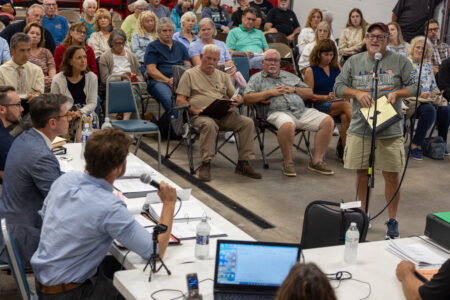A year later, Tioga, Potter counties still recovering from storm
(The Center Square) – A year after tropical storm Debby moved through Pennsylvania in its diminished state, residents of Potter and Tioga Counties are still recovering from flood waters.
The storm was hit or miss, with some residents experiencing very little rain and others seeing homes swept off their foundations. Some townships received as much as four inches of rain, and Gov. Josh Shapiro declared a state of emergency in several counties.
In Harrisburg, it brought a tornado. In some other states and parts of Canada, the destruction was widespread. One of the things that characterized this particular storm was its unpredictability and staying power.
With the increasing frequency and intensity of severe weather, many Pennsylvanians might be forgiven for forgetting about a storm like Debby.
For the residents impacted, however, feeling forgotten by state agencies like the Pennsylvania Emergency Management Agency, or PEMA, and its federal counterpart FEMA is unacceptable, though not unexpected.
Remote and rural regions of the state have “done so much with so little for so long,” said Sen. Cris Dush, R-Brookville, at a hearing of the Senate Veterans Affairs and Emergency Preparedness committee in Coudersport on Wednesday, “we can do practically anything with nothing.”
Representatives from the same region which already struggles from food and medical deserts say it’s under-resourced and unprepared for major disasters like the flooding caused by Debby. Towns who have seen steady trickles of their populations out toward urban areas with more work opportunities say they’re left out of the conversation in Harrisburg.
County and township officials testified before the Senate describing a scenario in which they did not have the human resources required for working through the months of paperwork and follow-up of disaster response, much less the financial flexibility to repair damages before receiving assistance. Stymied by what several testifiers referred to as “bureaucratic” issues, they sought agencies with the authority and background to act quickly and decisively.
Several speakers, including Dush and the committee’s chair Sen. Doug Mastriano, R-Chambersburg, and Potter County Commissioner Robert Rossman lamented that the National Guard wasn’t pulled in to oversee recovery efforts. Specifically, they pointed to bridges that are still out, dykes that took months to repair, and a three-day stint without water for the Galeton Borough.
“When federal and state agencies fail, it’s small communities like ours that feel like we suffer the most,” said Amanda Paul, Galeton Borough secretary. “When we’re asking for accountability from both FEMA and PEMA to deliver the aid that was promised and for your continued support of our residents and for our only water source to not be left behind.”
Mastriano speculated that the difficulties seen in areas like Potter and Tioga County have less to do with their population sizes and more to do with their voting records.
“The optics is the Shapiro administration, which you represent here, is walking away from conservatives,” said Mastriano addressing PEMA Deputy Director Larry West. “It’s about the people, and I want to see concern and interest in the people recovering in Potter and Tioga or Beaver Counties, rather than just focusing on blue areas of the state.”
For West, however, many of the complications come from factors beyond the political leanings of a given location. The commonwealth’s home-rule structure puts each individual municipality in charge of emergency response, meaning PEMA’s actions are substantially limited to what information they receive from county and township officials.
In red regions of the solidly blue state of New York, recovery seemed to go quickly and smoothly with several testifiers mentioning assistance their neighbors provided from across state lines.
“It made us look really incapable of handling anything,” said Travis Miles, roadmaster of Genesee Township.
The thing that stood out the most to each of the testifiers, from residents to elected officials, was the way that community members banded together to assist each other. Neighbors shared water and supplies and worked to make sure the elderly and disabled had what they needed.
“You’d almost be willing to go through it again just to experience what it was for the outpouring and the people on site and everybody that was there to help,” said resident Stephen Tinder.
Many fear that going through it again is a matter of when and not if, a reality Sen. Katie Muth, D-Royersford, spoke to in opening statements.
“Unfortunately tropical storm Debby is not a one-off storm, and over the past century massive increases of greenhouse gas emissions have caused the temperature of our planet to rise causing climate disasters that will only get worse,” said Muth, calling on polluting industries to provide financial support to affected areas.



